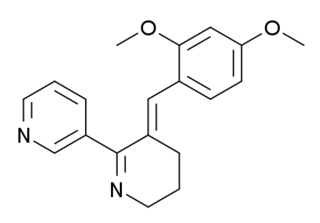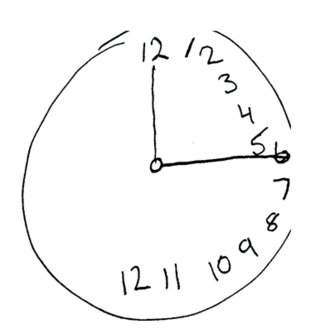
Dementia is a syndrome associated with many neurodegenerative diseases, characterized by a general decline in cognitive abilities that affects a person's ability to perform everyday activities. This typically involves problems with memory, thinking, behavior, and motor control. Aside from memory impairment and a disruption in thought patterns, the most common symptoms of dementia include emotional problems, difficulties with language, and decreased motivation. The symptoms may be described as occurring in a continuum over several stages. Dementia ultimately has a significant effect on the individual, their caregivers, and their social relationships in general. A diagnosis of dementia requires the observation of a change from a person's usual mental functioning and a greater cognitive decline than might be caused by the normal aging process.

Dementia with Lewy bodies (DLB) is a type of dementia characterized by changes in sleep, behavior, cognition, movement, and regulation of automatic bodily functions. Memory loss is not always an early symptom. The disease worsens over time and is usually diagnosed when cognitive impairment interferes with normal daily functioning. Together with Parkinson's disease dementia, DLB is one of the two Lewy body dementias. It is a common form of dementia, but the prevalence is not known accurately and many diagnoses are missed. The disease was first described on autopsy by Kenji Kosaka in 1976, and he named the condition several years later.

Neuropsychological tests are specifically designed tasks that are used to measure a psychological function known to be linked to a particular brain structure or pathway. Tests are used for research into brain function and in a clinical setting for the diagnosis of deficits. They usually involve the systematic administration of clearly defined procedures in a formal environment. Neuropsychological tests are typically administered to a single person working with an examiner in a quiet office environment, free from distractions. As such, it can be argued that neuropsychological tests at times offer an estimate of a person's peak level of cognitive performance. Neuropsychological tests are a core component of the process of conducting neuropsychological assessment, along with personal, interpersonal and contextual factors.

Donepezil, sold under the brand name Aricept among others, is a medication used to treat dementia of the Alzheimer's type. It appears to result in a small benefit in mental function and ability to function. Use, however, has not been shown to change the progression of the disease. Treatment should be stopped if no benefit is seen. It is taken by mouth or via a transdermal patch.
Cognitive disorders (CDs), also known as neurocognitive disorders (NCDs), are a category of mental health disorders that primarily affect cognitive abilities including learning, memory, perception, and problem-solving. Neurocognitive disorders include delirium, mild neurocognitive disorders, and major neurocognitive disorder. They are defined by deficits in cognitive ability that are acquired, typically represent decline, and may have an underlying brain pathology. The DSM-5 defines six key domains of cognitive function: executive function, learning and memory, perceptual-motor function, language, complex attention, and social cognition.
The mini–mental state examination (MMSE) or Folstein test is a 30-point questionnaire that is used extensively in clinical and research settings to measure cognitive impairment. It is commonly used in medicine and allied health to screen for dementia. It is also used to estimate the severity and progression of cognitive impairment and to follow the course of cognitive changes in an individual over time; thus making it an effective way to document an individual's response to treatment. The MMSE's purpose has been not, on its own, to provide a diagnosis for any particular nosological entity.
Edith F. Kaplan was an American psychologist. She was a pioneer of neuropsychological tests and did most of her work at the Boston VA Hospital. Kaplan is known for her promotion of clinical neuropsychology as a specialty area in psychology. She examined brain-behavioral relationships in aphasia, apraxia, developmental issues in clinical neuropsychology, as well as normal and abnormal aging. Kaplan helped develop a new method of assessing brain function with neuropsychological assessment, called "The Boston Process Approach."
The Clinical Dementia Rating or CDR is a numeric scale used to quantify the severity of symptoms of dementia.
Cognitive impairment is an inclusive term to describe any characteristic that acts as a barrier to the cognition process or different areas of cognition. Cognition, also known as cognitive function, refers to the mental processes of how a person gains knowledge, uses existing knowledge, and understands things that are happening around them using their thoughts and senses. Cognitive impairment can be in different domains or aspects of a person's cognitive function including memory, attention span, planning, reasoning, decision-making, language, executive functioning, and visuospatial functioning. The term cognitive impairment covers many different diseases and conditions and may also be symptom or manifestation of a different underlying condition. Examples include impairments in overall intelligence, specific and restricted impairments in cognitive abilities, neuropsychological impairments, or it may describe drug-induced impairment in cognition and memory. Cognitive impairments may be short-term, progressive, or permanent.
Mild cognitive impairment (MCI) is a neurocognitive disorder which involves cognitive impairments beyond those expected based on an individual's age and education but which are not significant enough to interfere with instrumental activities of daily living. MCI may occur as a transitional stage between normal aging and dementia, especially Alzheimer's disease. It includes both memory and non-memory impairments. The cause of the disorder remains unclear, as well as both its prevention and treatment, with some 50 percent of people diagnosed with it going on to develop Alzheimer's disease within five years. The diagnosis can also serve as an early indicator for other types of dementia, although MCI may remain stable or even remit.
Pseudodementia is a condition that leads to cognitive and functional impairment imitating dementia that is secondary to psychiatric disorders, especially depression. Pseudodementia can develop in a wide range of neuropsychiatric disease such as depression, schizophrenia and other psychosis, mania, dissociative disorders, and conversion disorders. The presentations of pseudodementia may mimic organic dementia, but are essentially reversible on treatment and doesn't lead to actual brain degeneration. However, it has been found that some of the cognitive symptoms associated with pseudodementia can persist as residual symptoms and even transform into true neurodegenerative dementia in some cases.

GTS-21 is a drug that has been shown to enhance memory and cognitive function. It has been studied for its potential therapeutic uses, particularly in the treatment of neurodegenerative diseases and psychiatric disorders.

Alzheimer's disease (AD) is a neurodegenerative disease that usually starts slowly and progressively worsens, and is the cause of 60–70% of cases of dementia. The most common early symptom is difficulty in remembering recent events. As the disease advances, symptoms can include problems with language, disorientation, mood swings, loss of motivation, self-neglect, and behavioral issues. As a person's condition declines, they often withdraw from family and society. Gradually, bodily functions are lost, ultimately leading to death. Although the speed of progression can vary, the average life expectancy following diagnosis is three to twelve years.
The Cambridge Neuropsychological Test Automated Battery (CANTAB), originally developed at the University of Cambridge in the 1980s but now provided in a commercial capacity by Cambridge Cognition, is a computer-based cognitive assessment system consisting of a battery of neuropsychological tests, administered to subjects using a touch screen computer. The CANTAB tests were co-invented by Professor Trevor Robbins and Professor Barbara Sahakian. The 25 tests in CANTAB examine various areas of cognitive function, including:

The Montreal Cognitive Assessment (MoCA) is a widely used screening assessment for detecting cognitive impairment. It was created in 1996 by Ziad Nasreddine in Montreal, Quebec. It was validated in the setting of mild cognitive impairment (MCI), and has subsequently been adopted in numerous other clinical settings. This test consists of 30 points and takes 10 minutes for the individual to complete. The original English version is performed in seven steps, which may change in some countries dependent on education and culture. The basics of this test include short-term memory, executive function, attention, focus, and more.

Ladostigil is a novel neuroprotective agent being investigated for the treatment of neurodegenerative disorders like Alzheimer's disease, Lewy body disease, and Parkinson's disease. It was developed from structural modification of rasagiline.

Rivastigmine, sold under the brand name Exelon among others, is an acetylcholinesterase inhibitor used for the treatment of dementia associated with Alzheimer's disease and with Parkinson's disease. Rivastigmine can be administered orally or via a transdermal patch; the latter form reduces the prevalence of side effects, which typically include nausea and vomiting.
The Addenbrooke's Cognitive Examination (ACE) and its subsequent versions are neuropsychological tests used to identify cognitive impairment in conditions such as dementia.
The mini-SEA is a neuropsychological battery aiming to evaluate the impairment of the social and emotional cognition. Developed by Maxime Bertoux in 2012, the mini-SEA has been preferentially designed for the assessment, follow-up and diagnosis of neurodegenerative diseases such as the frontotemporal dementia, but is more generally designed to evaluate the integrity of the frontal lobes.
The Cogstate Brief Battery (CBB) is a computer-based cognitive assessment used in clinical trials, healthcare, and academic research to measure neurological cognition. It was developed by Cogstate Ltd.








